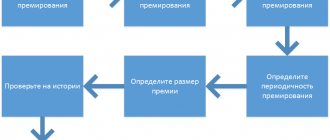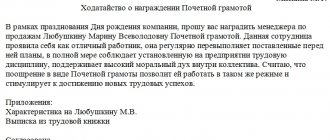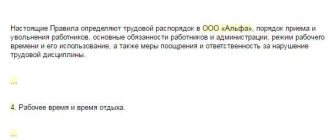Home / Labor Law / Payment and Benefits / Bonuses
Back
Published: 01/12/2018
Reading time: 7 min
0
5047
Along with disciplinary sanctions that can be applied to employees in accordance with the Labor Code of the Russian Federation, some companies practice the use of material forms of punishment.
One of these forms is depreciation, which, subject to certain rules, can be used quite legally. It is worth considering the basic rules for using bonus reduction in an enterprise, as well as the conditions for the legality of this procedure.
- Deprivation of bonuses: essence and legislative regulation
- Legality of the procedure: conditions and possible violations
- Advantages and disadvantages
Dear readers! To solve your problem, call hotline 8 or ask a question on the website. It's free.
Ask a Question
Where, according to the Labor Code, does the employer establish the procedure for awarding bonuses and depriving them of bonuses?
The Labor Code allows you to set an employee’s salary, making it up of several parts (Article 129):
- payment for the work itself;
- additional payments for special working conditions;
- incentive payments, among which bonuses usually play a leading role.
If the first 2 parts are sufficiently regulated by law, then with regard to establishing bonus rules, the employer can act independently (Article 135 of the Labor Code of the Russian Federation), determining at its discretion:
- quantity, types and, accordingly, a specific list of bonuses paid;
- the frequency of their accrual and the circle of employees who will be entitled to one or another type of bonus;
- a list of those indicators, the fulfillment of which entails the emergence of the right to receive a bonus;
- a system for assessing the value of each type of bonus, the procedure for considering the results of this assessment and a procedure that allows an employee to challenge these results;
- grounds that serve as a reason for depriving an employee of a bonus.
The Labor Code of the Russian Federation does not contain any restrictions for establishing these rules, obliging the employer only to:
- enshrine them in an internal regulatory act, without prohibiting the use of an employment agreement with a specific employee as such an act;
- coordinate the content of this act with representatives of the labor collective, and for state unitary enterprises and municipal unitary enterprises - with uniform recommendations developed by the Russian tripartite commission (consisting of representatives of the Government of the Russian Federation, trade unions and employers) on the regulation of social and labor relations;
- not to worsen the terms of remuneration of a particular employee in comparison with the developed normative act, and the conditions of this act - in comparison with the norms of labor law;
- familiarize each employee with the rules for bonuses against receipt.
Thus, establishing a procedure for depriving an employee of a bonus under the Labor Code of the Russian Federation means enshrining the rules of this procedure in the internal regulatory act on bonuses.
For information about which documents may establish bonus rules, read the materials: “The procedure for paying bonuses under the Labor Code of the Russian Federation” and “Accruing bonuses to an employee in different situations .
The article “Calculation of the quarterly bonus for actual time worked” will tell you how to calculate the bonus for the time actually worked and the peculiarities of its taxation.
Grounds for deprivation of bonuses - why are bonuses deprived at work?
What can you deprive of a bonus for? There are many reasons for non-payment of premiums. The reasons most often indicated in a regulatory act are:
- whether the employee has received a disciplinary sanction during the bonus period;
- the presence of a disciplinary offense during the bonus period (regardless of whether it entailed disciplinary action);
- dismissal during the bonus period;
- bonus period not fully worked out.
In addition, deprivation of a bonus can be carried out by decision of the manager, the right to which:
- or is enshrined in the internal regulatory act on bonuses as one or the only reason for non-payment of bonuses;
- or appears if the normative act on bonuses does not contain a description of the procedure for depriving the bonus.
The employer's participation in the reduction of bonuses for the reasons listed in the normative act can also be expressed in the fact that it determines what part of the total bonus amount the employee is deprived of the bonus.
Legality of depreciation
Is deprivation of a bonus a disciplinary sanction or not? Having answered this question quite clearly “no,” it is important not to forget about this while studying the concept of depreciation. The legality of applying such a penalty is primarily determined by the statements of local regulations. However, in the absence of clear instructions on this issue, the employer is able to independently decide whether to issue a bonus or deprive it.
This form of punishment will not contradict the provisions of the legislation of the Russian Federation in the cases that we discussed in the paragraph on the nature of the penalty. However, the final decision will also depend on the statements prescribed at the enterprise and approved in accordance with a number of local acts.
The first reason for applying punishment is violation of labor discipline. When using bonus reduction, it is necessary to comply with the principle of proportionality, fair and fair assessment. The bonus provision should include nuances regarding the complete or partial deprivation of funds. It is also important to determine periods of non-payment. Do not forget that the very concept of deprivation of bonuses is absent in the legislative documents of the Russian Federation.
Is deprivation of a bonus a disciplinary sanction or not?
Is deprivation of a bonus a disciplinary sanction? In no case! The list of disciplinary sanctions is strictly defined by Art. 192 of the Labor Code of the Russian Federation - and deprivation of bonuses is not among them.
What types of disciplinary sanctions are there and how they are applied to employees, read the material “Types of disciplinary sanctions under the Labor Code of the Russian Federation.”
At the same time, a direct connection between disciplinary action and deprivation of bonuses, as a rule, exists, since the presence of this penalty among the reasons why an employee loses the right to bonuses occupies a leading position. However, a certain sequence must always be followed: first, a disciplinary sanction for an offense, and then the deprivation of a bonus due to the presence of this sanction.
Imposing a disciplinary sanction is a right, not an obligation of the employer (Article 22 of the Labor Code of the Russian Federation), that is, having considered the circumstances of the offense, he may not punish the employee. Then, in a situation where the manager makes a decision not to apply a disciplinary sanction for an offense committed, and an internal regulatory act provides for the deprivation of a bonus precisely for the presence of a penalty, the employee cannot be deprived of bonuses. But if a disciplinary offense is specified as a basis for deprivation of a bonus, then regardless of whether punishment follows, the employee will be left without a bonus.
A disciplinary offense and a disciplinary sanction are formalized according to certain rules that must be strictly observed so that the employee cannot challenge the established fact of the misconduct and the legality of the penalty and, accordingly, cannot claim that the deprivation of a bonus was unlawful on any of these grounds.
How does the depreciation process work?
The procedure for depriving an employee of a bonus will consist of the following stages:
- The employer receives a memo from the immediate supervisor, which indicates that the employee has violated labor discipline or other misconduct . This note is written in free form. The preferred type of punishment here is deprivation of the employee's bonus.
- The fact of awarding bonuses to an employee is established by order of the manager . Therefore, when depreciating, the employer simply does not award the employee the required bonus and does not issue such an order.
A sample memorandum on dismissal of an employee can be downloaded from the link.
The legislation does not indicate the employer’s obligation to issue an order if the employee does not have the right to bonuses. But such an obligation may be assigned to the employer by a local regulatory document or a collective agreement. According to established judicial practice, a depreciation order is not mandatory.
If the employer has issued an order to deprive the employee of a bonus or reduce its size, then it is not necessary to familiarize him with the contents of the order, unless otherwise provided by internal documents.
When an employer issues a corresponding order based on non-payment of bonuses, it should avoid terms such as “deprivation of bonuses” or “deprivation of bonuses” and replace them with “non-accrual”. Instead of “violation” as a basis for depriving a bonus, it is better to use “for failure to achieve indicators.”
It is important to consider that the employer cannot award a bonus and then withhold a certain part of it due to a disciplinary offense. This is against the law.
But if the Regulations on Bonuses or another document states that in the presence of disciplinary sanctions, the employee is not paid a bonus, then the procedure for deboning will be as follows:
- The employer becomes aware that the employee has committed a disciplinary offense . This fact can be revealed based on the results of receiving an official or memo, report, internal investigation, inventory, audit, etc.
- He requests an explanation from the employee about the reasons for the incident . The employee will have two days to prepare the explanatory note.
- An order is issued to bring the employee to disciplinary liability in the form of a reprimand or reprimand (in case of dismissal, deprivation of a bonus makes no sense). The employee is familiarized with the contents of this order against signature within 3 days after its issuance.
- Starting from the date of issuance of the order imposing disciplinary punishment on the employee, the penalty imposed on him will be valid for one year . During this period, he may not receive a bonus (the main thing is that this possibility is specified in the employer’s local documentation, and the employee is familiar with it in advance).
- The employer has the right to early lifting of a disciplinary sanction . In this case, an order is issued and from that day the employee begins to receive a bonus.
All documents on imposing a disciplinary sanction on an employee must be kept by the employer. This is a document providing the basis for prosecution, an explanatory note from the employee or an act of refusal to give explanations, an order to bring the employee to disciplinary liability signed by the employee, or an act of refusal of the employee to sign the order.
If the employee can prove the illegality of the disciplinary sanction, then depriving the employee of a bonus automatically also becomes illegal. Therefore, the employer will have to issue an order to cancel the disciplinary sanction and pay the entire amount of debt in terms of bonuses (for the entire period until they were accrued and paid). The employer will also have to pay monetary compensation to the employee for delays in transferring bonuses and the amount of moral damage (if such is determined by a court decision).
In the case when an employee is deprived of a bonus due to violation of labor discipline without applying a penalty (bringing an employee to disciplinary liability is a right, not an obligation of the employer), then the employer does not need to follow the procedure prescribed in Art. 193 TK. In particular, demand any explanations about the causes of the incident. Moreover, depriving an employee of bonuses using the algorithm established by the Labor Code in relation to disciplinary sanctions may be regarded by regulatory authorities as the use by the employer of a type of penalty not established by law, and such actions are considered illegal.
At the same time, local regulations may provide for a certain procedure for depreciation. In this case, the employer’s violation of its own requirements may be regarded as a violation.
What to do if bonuses were deprived without reading the order?
Can an employer deprive a bonus without an order? Yes it is possible. In a situation where, in the internal regulatory act on bonuses, which the employee was promptly familiarized with on receipt, one of the reasons for deprivation of a bonus is the reason why he was not accrued a bonus for the corresponding period, there is no need to draw up a separate order. In this case, the reason must be documented - the basis for not accruing the bonus. An employee who does not agree with the fact that he was deprived of a bonus will have to challenge not the reason for its non-accrual, but the legality of the basis on which the deprivation became possible.
When an order to deprive an employee of a bonus is needed and how to formalize it, read the article “Sample order to deprive an employee of a bonus.”
The presence of an order to reduce bonuses becomes mandatory when the decision not to pay a bonus to an employee is made by the employer. This is possible in the following situations:
- when the basis for deprivation of a bonus is not in the list given in the regulatory act on bonuses, but the same act gives the manager the right to make a decision on deprivation of bonuses;
- when the regulatory act on bonuses indicates a decision on this made by the manager as the only reason for deprivation of a bonus;
- when the manager has the right to establish the amount of the share by which the amount of bonuses is reduced upon the occurrence of the grounds provided for deduction of bonuses by the normative act;
- when the normative act on bonuses does not indicate the grounds for deprivation of the bonus at all.
Thus, when an employee is not informed of the order to forfeit bonuses, this is not always illegal. Therefore, before filing claims with the employer (the labor inspectorate or the court), you should carefully read the text of the existing internal regulations on bonuses.
Formulation of the legal basis for deprivation of a bonus
In legal practice, documents are considered, not intentions. Therefore, it is very important to correctly formalize the reduction in the level of bonus payments to guilty employees. Managers often use the words “deprive”, “remove”, “retain”. But this approach, taking into account the requirements of labor legislation, is not always correct. After all, in essence, you are withdrawing part of the employee’s salary. And this is a clear violation.
In this case, it is advisable to try the following words and phrases: “reduce”, “not count”, “do not pay”. In this case, it is necessary to add a link to a specific paragraph of the Bonus Regulations, which provides for the norm for reducing the bonus level.
Example of incorrect wording:
“Remove I.P. Ivanov from the electrician. 100% bonus based on work results in June 2020.”
Example of acceptable wording:
“In accordance with the clause of the Regulations on bonuses, for a violation of labor protection, confirmed by a report from labor safety engineer S.S. Vetrov, reduce the size of the bonus to electrician V.V. Sidorov. by 50% based on the results of work in June 2020.”
Such wording should be reflected in the minutes of the commission meeting, as well as in the subsequent order of the head of the company.
Remember, the correct wording in the event of a reduction in the level of an employee’s bonus will allow the company to avoid troubles with the trade union, labor inspectorate, and prosecutor’s office in the future.
Can a pregnant woman be deprived of bonuses for being late?
Is it possible for a pregnant woman to be deprived of a bonus due to her violation of labor discipline, in particular due to being late? Yes, you can.
Pregnancy does not give the right to any special treatment for a woman expecting a child. Therefore, if a violation of labor discipline (i.e., a disciplinary offense) has occurred and this basis is present among the reasons indicated in the internal regulatory act as leading to the deprivation of a bonus, then a deprivation of bonuses will certainly follow.
It may not exist if the regulatory act specifies the presence of a disciplinary sanction as a basis for non-payment of bonuses. In this case, if when committing an offense there is no decision on punishment for it, there will be no deprivation of the bonus.
What is employee depreciation?
In addition to the mandatory salary, an employee can also receive bonus payments, which can be either systematic or accrued on a case-by-case basis. The answer to the question of whether to give or not to give a bonus depends on whether the planned indicators have been achieved in the work.
Additional payments are not obligatory (unlike salary), and the employer independently decides whether to pay them to his employees or not.
Deprivation of bonuses to employees is a punishment provided for by the Labor Code of the Russian Federation for a disciplinary offense. In this case, the person may be completely deprived of the bonus or have it cut. It should be emphasized that this form of punishment acts as a fine, is applied specifically to violators of internal regulations and is not a disciplinary sanction.
Management may decide to terminate or suspend the payment of bonuses, necessarily indicating the reasons in the company’s internal documentation or in a special provision.
Simply put, depreciation of employees is a way to deprive a person of additional material rewards (in full or partial) if he has done something wrong.
It should be remembered that not a single law, regulatory legal act or the same Labor Code includes such a concept as depreciation. This means that this method of punishment cannot be legally approved at the level of the company’s local documentation.
We recommend
“Bonus payments to employees of an organization and its documentation” Read more
Therefore, from the point of view of practical application, depreciation of employees means that an employee receives a bonus only if he fulfills the agreed list of conditions. They might be something like this:
- the employee completed the planned amount of work;
- he did not violate discipline;
- the planned plan was exceeded, etc.
If it turns out that these conditions are not met, the employer has the right to reduce the amount of the bonus payment.
The bonus must be reflected in the company's documentation as an additional method of monetary incentives and cannot be part of the basic salary. At the same time, it is allowed to deprive employees who already have a disciplinary sanction - for example, in the form of a reprimand. Many enterprises practice issuing bonuses in an envelope, without any official registration. In this case, the employer can easily decide for himself who to encourage and who not, determine the amount of remuneration at his own discretion, etc. If at an enterprise the bonus procedure is stipulated in special acts, then it should be observed, and the deprivation of an employee of material remuneration should have has a legal basis.
When is deprivation of a bonus regarded as illegal?
Deprivation of a bonus can be considered illegal in the following cases:
- The basis for deprivation of a bonus is not included in the list given in the text of the employer’s internal regulatory act, and this act does not provide the employer with the right to make decisions regarding non-payment of bonuses.
- Documents for depreciation on the basis of the presence of a disciplinary sanction against the employee or the commission of a disciplinary offense have not been properly completed.
- There is no order to deprive a bonus in the case where the execution of such a document is mandatory (i.e. when the decision on deprivation of bonuses or on the size of the share of reduction in the bonus is made by the employer).
- Deprivation of a bonus occurs without familiarizing the employee with the order on depreciation in situations where the issuance of such an order turns out to be mandatory.
The procedure for depriving an employee of a bonus under articles of the Labor Code of the Russian Federation
The mechanism for depriving employees of bonuses entails a considerable number of features that it is recommended that not only employers, but also employees be aware of.
The latter must, if necessary, defend their interests by contacting the labor inspectorate or court. For this reason, it is advisable to consider them in more detail.
How to register correctly
In order to deprive an employee of a bonus, he must adhere to the generally accepted mechanism of action, which in 2019 is as follows:
| Initially, there is a need to obtain an act that can reflect the fact that the employee has violated his official obligations. | In most cases, the head of a structural unit needs to prepare a memorandum, which indicates the grounds for the decision made |
| It is necessary to study the list of criteria | On the basis of which bonuses and other incentives may be calculated. As a rule, this should be detailed in the local documentation of the enterprise |
| A worker is preparing an explanatory note | With display of the reasons for the violation |
| Next, the entire collected package of documents must be transferred to the accounting department and the personnel department. | Based on the information received, officials make a decision on disciplinary action. |
| Based on the decision made, the corresponding Order is formed | Only on the basis of its signing can the premium not be officially paid |
| The order is handed over to the employee for review purposes. | And from this moment it is considered as having entered into legal significance |
Only if such actions are observed, depreciation is considered legal.
Preparation of the corresponding order
Due to the fact that Russian legislation does not provide for a specific form of the relevant Order, many employers make various mistakes when forming it.
In the document in question, it is possible to display key data that requires transfers of funds.
In addition, you need to indicate the reasons for the decision to deprive yourself of bonuses. At the same time, do not forget to refer to labor legislation.
Despite the lack of clear regulation by law, you must adhere to standard rules, which are as follows:
| The full name of the enterprise must be indicated at the top of the document | As well as the selected legal form and registration number |
| After this, you need to indicate the name of the document in the center | "Order" |
| It is mandatory to indicate the personal information of the employee | Who, due to violation of the terms of the employment contract, is deprived of his bonus. In addition to your initials, you must indicate your position and department |
| In case of temporary replacement of any position | And at the same time, the fact of violation of official duties was established, then this must be indicated in the Order |
| The amount of the premium is indicated in words and numbers | Which was lost to hired employees |
Results
The provisions of the Labor Code of the Russian Federation oblige the employer to independently develop rules for bonuses for employees, enshrining them in an internal regulatory act.
These rules usually include a section devoted to situations in which an employee is deprived of the right to receive bonuses. Most often, the loss of a bonus is tied to the commission of disciplinary offenses or the presence of penalties for them, which requires special care when drawing up all procedures related to violations of a disciplinary nature. For a number of situations, it is necessary to issue an order to forfeit the bonus, and the absence of such an order in these cases makes non-payment of the bonus illegal. You can find more complete information on the topic in ConsultantPlus. Full and free access to the system for 2 days.







